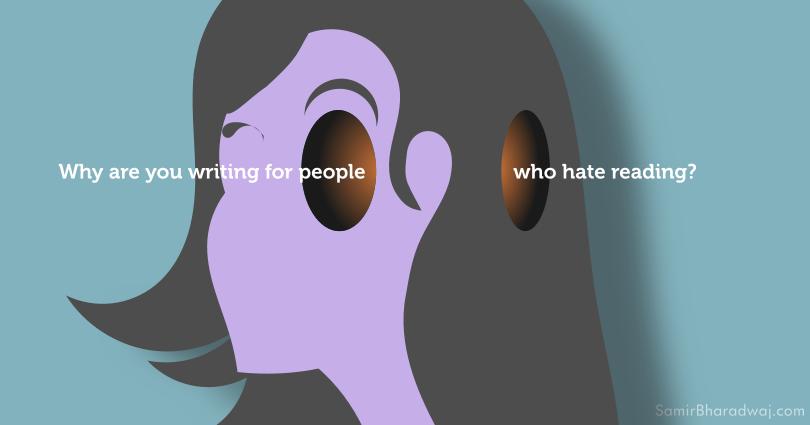
Writing advice has changed over the centuries. In the beginning, which I’m arbitrarily choosing to be the invention of the modern novel, the audience was select and unusually literate. Writing advice at the time was very much about quality and the effect on the discerning reader. Let’s face it, when literacy is not a close-to-universal thing, quite a large number of your small readership is discerning or must pretend to be.
As the reading populace grew, the advice of writers, and to writers, changed. Now it wasn’t about impressing and wowing your readers, not about taking them to new adventures in language, it was now about holding their attention consistently. You wanted to make sure they stick to your book and not pick up that magazine, so temptingly distracting them on the table.
Writing advice now is a vastly different beast. It’s presented in more genteel terms and decorated with the support of convenient brain research and retail and marketing psychology, but at its core, writing advice today comes down to taking what you have to say and blending it down to a very fine and pasty protein shake. This product can then be gulped down, by what can now only be termed as content consumers, while providing the least risk of resistance from or effect on the consumer as possible, linguistically, culturally and intellectually. Today you’re advised to write for people who hate to read.
I’m surprised novels don’t have bullet-point summaries in the front-matter already. I suspect that has only failed to happen for a couple of reasons. Many of the people reading books today might hate reading, but perhaps a large number of people involved in the writing and production of books do like it, which prevents the complete slide into irrelevance. Then there is the unexpected irony of people who hate reading still fetishising the impression of themselves as avid readers and being well read. The current exhibitionist social media nexus we’ve created has perhaps done more for our inability to read long-form writing, and contrastingly, more for our need to display one’s intellectual and literary athleticism, than any single social pressure before it. The reason you don’t see bullet-point lists in your fantasy novel, ladies and gentlemen (we just use wikis to do that), is because even stupid people are not stupid enough to think that this wouldn’t erode their Goodreads bragging rights.
My surprise at the bullet-point not being an acknowledged part of longer written material, besides business scripture, is because I know there are vast swathes of people who read that way already. If you are someone who actually savours every word of a book you pick up, you might be shocked to know that several of your friends, who you see as passionate readers, skip through these books with gay abandon. They only bother with the ‘interesting bits’ or skim through and jump over pages until their keen literary eye detects that ‘something is happening’. These are a good chunk of what we consider readers today. This, of course, is ignoring the even larger number of people who buy books as decorative items for their living rooms, so that they can then pretend to have read them after stumbling over the Wikipedia page for the facts, and Goodreads and Amazon reviews for their opinions.
There’s an old saying about the character of people, that it ranges upwards from those who merely talk about people, about events, and about ideas. The quality of readers can similarly be assigned to a range of people. From those who skip to find people talking, those who skip less to detect when their definition of ‘something’ is happening, and those very few who actually read everything in order to absorb any larger ideas and themes in the writing. Other than that last group, we can safely say that, though in denial about it, the rest dislike reading, in the least. They probably like having read something and they like to identify as bookworms or bibliophiles or whatever, but none of that has much to do with the journey of reading itself. Reading is an unfolding of what another human being wants to convey into your imagination. Unfortunately, an increasing number of us incapable of listening.
So lets get back to the original question:
Why are you writing for people who hate reading?
It’s no surprise that there are several good to adequate reasons to do it. One big reason is that you are selling something. Most writing is a tool of marketing, there’s no denying that, to the point where the age old term wouldn’t do any more, so we invented the ‘content writer’. It’s a much required function, of course, but if you are a practitioner, one of your only jobs is to write in ways that makes it palatable for people who hate reading. That’s the work.
You could be selling more subtle things, as well. You could be selling your expertise, your new pet theory for which you want to be paid, or you could be selling your young-adult reader on buying into the next seven sequels of your interchangeable post-apocalyptic octology of novels and the films you pray will be made from them to save you from drudgery. All these sales need to be made to a broad audience, including a large number who hate reading, so you do what you need to.
Informing people (different from teaching or educating, which still requires excellent writing in my book, as rare as that is) also requires writing for people who hate reading. Ironically, disclaimers, financial offer documents, rules and regulations, and all such purely informational writing is the most often verbose and impenetrable. But if you need a reason to write for haters, these would be good reasons.
If you are a Writer, though, with a capital ‘W’, someone who writes because they enjoy it, because they must, because they like the idea of their thoughts unfolding in the imagination of another being, why do you write for people who hate reading? It doesn’t make sense.
I understand you’ve been sold this model. Writing for the lowest common denominator. Writing in the least challenging, most condescending way, so as not to even slightly encourage the reader to rise above what they think they are. Writing reduced to a function and traumatised by the idea of expression. You’ve been sold this vision because it goes far beyond writing in our world today. Today, our education is for people who hate learning, our technologies are made for people who hate technology, even our films are made for people who hate sitting through films. All this travesty is justified using the new sullied name of my beloved Design. This is not design, it is pandering, but that’s a topic for another time.
I have news for you, the ones who hate reading are not reading you anyway. They are not listening. They are merely skipping around to the colourful bits and making the right social noises. Those of us who do love to read are left with vast wastelands of text with nothing to unfold, though our fingers itch to do so. For the sake of all those who love the words, please write for people who love to read. You will be better for it, your writing will be better for it, and perhaps, just perhaps, a few of your readers will come out of it better. Don’t be afraid, this is how it’s supposed to work.
Samir
Liked this article? Please share it: ![]()
![]()
![]()
![]()
![]()
![]()



This was so funny and inspiring!
Thanks,
A
Adrienne, thank you so much for dropping by and very glad to know you enjoyed this.
It was something that had been bothering for a while, and it was nice to air my views. Even better now to know it makes sense to someone else and affects them with a smile. 🙂
Samir
Gone are the days when youngster spent most of their time reading novels. After the advent of internet, I have not come across a single person who discussed about a novel or any well written book for that matter.
Cool and inspiring!